An Odor-Control Pact
with Carpinteria Cannabis
Growers Breaks Down
‘We Kept Our Promises, and They Broke Theirs,’
Citizens’ Coalition Says
by Melinda Burns | November 30, 2023
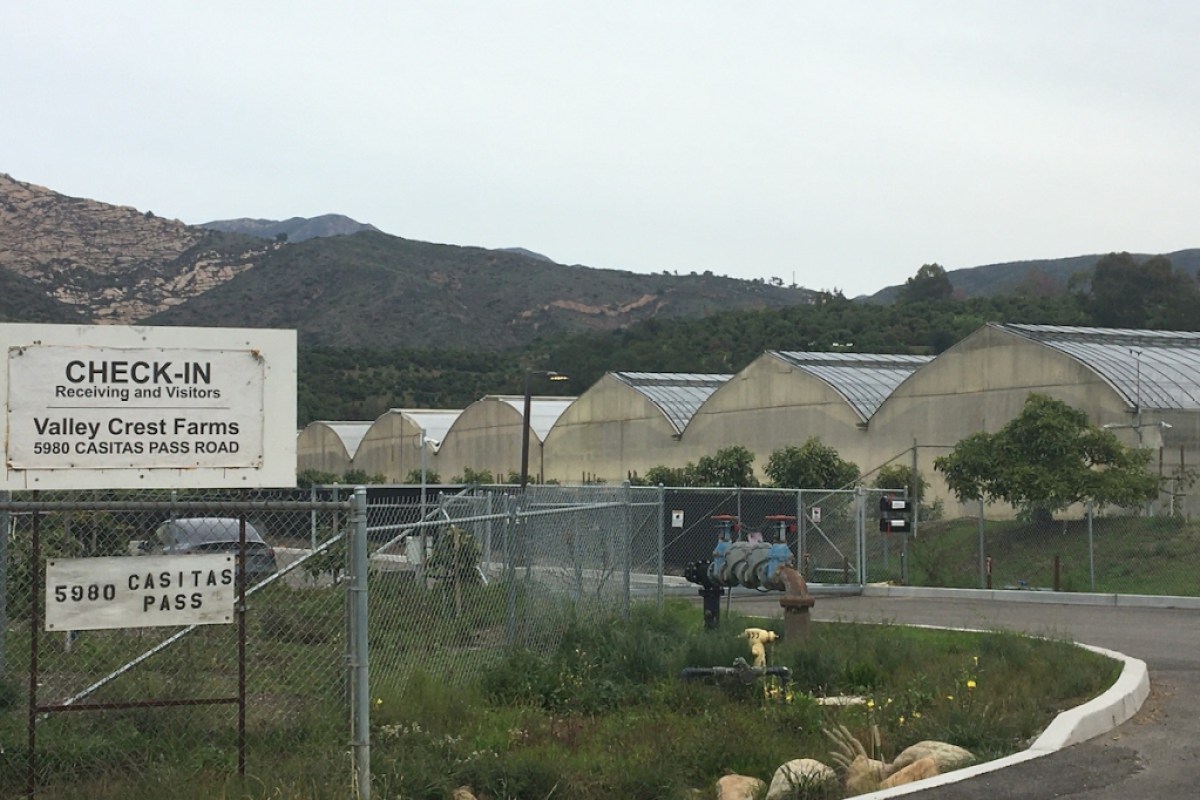
It’s been more than two years since the Santa Barbara Coalition for Responsible Cannabis signed a peace treaty with a leading growers’ organization in the Carpinteria Valley.
Today, the coalition says, that agreement is in tatters.
The agreement of August 2021 was an odor-control pact signed by the coalition, a countywide advocacy group of about 200 members, and the Cannabis Association for Responsible Producers, or CARP Growers, representing most of the valley’s greenhouse owners.
The coalition’s assent was a tacit concession that suing the growers and challenging their permits had failed to halt the wholesale conversion of the flower greenhouses ringing the beach town of Carpinteria to smelly, industrial-scale pot.

Now, however, the coalition has gone back to court.
In September, the group filed a class-action lawsuit in Santa Barbara County Superior Court against Case and Alex Van Wingerden, a father and son who are members of CARP Growers. They own 19 acres of cannabis at Valley Crest Farms and Ceres Farm on Casitas Pass Road. The lawsuit alleges that the “ever-present noxious odor” and “thick, heavy, strong stench of cannabis” in the neighborhood from these operations is a violation of the state Clean Air Act.
Valley-wide, the coalition says, the growers are dragging their feet and failing to adopt state-of-the-art clean-air technology in their open-vented greenhouses. Carbon filters called “scrubbers” have been shown to be effective in preventing the “skunky” smell of pot from wafting out of the roof vents and into urban neighborhoods. Yet only four of 20 active “grows” in the valley are fully equipped with them, county records show.
In all, that’s 28 acres of cannabis greenhouses with scrubbers out of a total 116 acres under cultivation, or not quite one acre out of every four.
“We’ve been played,” Lionel Neff, a coalition director who signed the 2021 agreement, said this month. “We thought we were all working together on an answer to the problem, on the same track, going to the same destination. Everybody was rejoicing. We’d share beers together. Now we’re looking at this as promises made, promises broken. We kept our promises, and they broke theirs.”
As the private agreement breaks down, though, public policy may be shifting in favor of a requirement for the use of scrubbers in cannabis. For the first time, during an impromptu discussion at the county Board of Supervisors meeting this week, three out of five supervisors signaled that they were open to the idea.
“There’s good technology out there,” said Supervisor Laura Capps, who represents the Goleta Valley and has long advocated for stricter regulations for cannabis. “If it were any other industry, we would be requiring it.”

[Click to enlarge] CP1 Supply Systems is the only greenhouse near Carpinteria High School that has not been required to install carbon scrubbers. | Credit: Courtesy
Seven greenhouse operations totaling 30 acres are slated for scrubbers next year in the Carpinteria Valley, records show; the growers agreed to install them as a condition of their zoning permits. That means that in all, 58 acres, or half of the cannabis acreage under cultivation in the valley, could be equipped with scrubbers by the end of 2024.
But that’s only 36 percent of 162 acres of cannabis cultivation approved for permits to date. There is no requirement for scrubbers on the remaining acreage, with the exception of 13 acres at Vista Verde, an operation at 3450 Via Real that’s not yet online.

[Click to enlarge] The Santa Barbara Coalition for Responsible Cannabis is suing Case and Alex Van Wingerden, owners of the Valley Crest Farms and Ceres Farm, alleging that the stench of pot from their greenhouses has lowered neighboring property values and caused the Rose Story Farm to lose rental and business income. | Credit: Courtesy
(These figures do not include about eight acres in the valley approved for processing, the smelliest stage of cannabis production. Growers who are processing have installed carbon scrubbers inside their processing rooms and warehouses. These structures, unlike the greenhouses, are sealed and do not have open roof vents.)
CARP Growers Responds
Under the 2021 agreement with the coalition, CARP Growers committed to “continuously employing the best available control technology” so that the smell of pot could not be detected beyond the growers’ property lines. The association also agreed to a protocol for responding to odor complaints that, depending on the scope of the problem, could lead to a requirement to install state-of-the-art equipment.
In return, the coalition agreed not to sue the growers or oppose their project applications at county hearings, and even pledged to support them. CARP Growers hailed the agreement as “historic” and sent out press photos of their representatives smiling and clasping hands with coalition directors. During the year that followed, the coalition spent $150,000 helping the growers test odor-control technologies.
“This is the first I’ve heard of any collapse of an agreement with the coalition,” Graham Farrar, the CARP Growers president, said earlier this month. “We’re still certainly operating as if it’s intact. We’re all doing the things we said we would do. Many people are working on scrubbers on their own volition.”
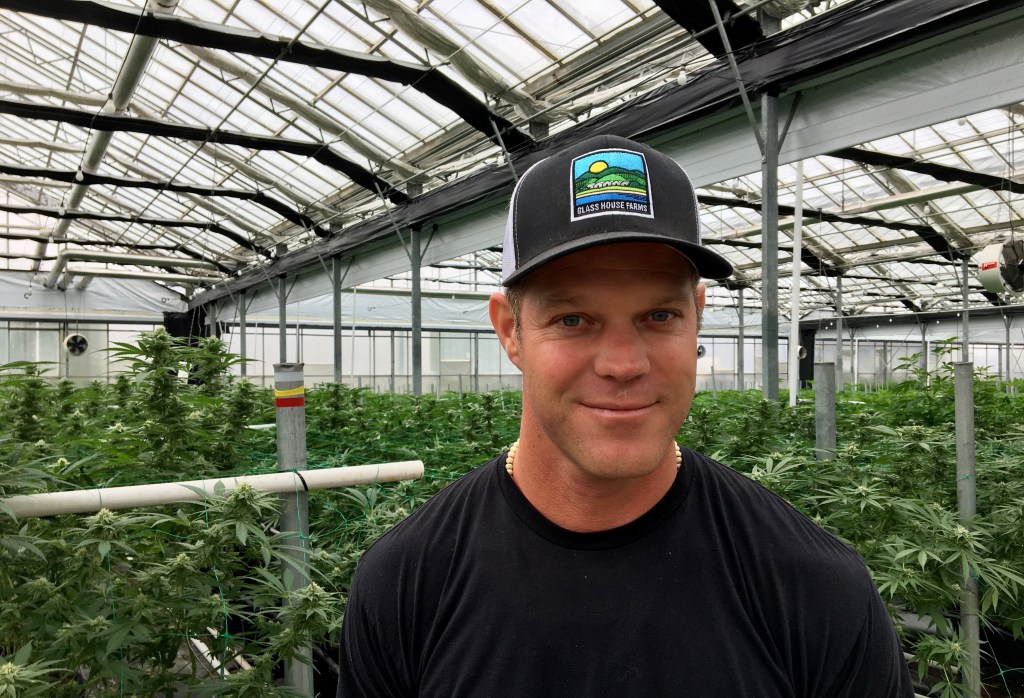
Farrar is one of the largest cannabis growers in California, with 125 acres of greenhouses in Ventura County and 11 acres in the Carpinteria Valley. The intention of the agreement, he said, was not to impose a one-size-fits-all technology on CARP Growers members, but rather to find a solution tailored to each site. Some greenhouses are not in close proximity to homes, he noted.
“There’s nowhere in there where it designates a specific model, technique, or odor technique,” Farrar said of the agreement. If neighbors complain about the smell, he said, the intention was that growers would “work with the community until the problem is solved.”
No Mandate
Though the smell of pot is much less noticeable in the valley than it was five years ago, residents say, hot spots persist in neighborhoods around Foothill and Casitas Pass roads, Padaro and Cravens lanes, Via Real, La Mirada Drive, and the polo club on Foothill — including neighborhoods near greenhouses owned or operated by present and past presidents of CARP Growers.
Carpinterians have filed more than 3,000 odor complaints with the county — including 350 this year — since the county Board of Supervisors opened the doors to a “green rush” in 2018. Many residents have complained of health problems such as asthma, sore throats, headaches, and eye irritation that they believe were brought on by the smell of pot.
The Van Wingerdens did not respond to requests for comment on the recent lawsuit. But in a court filing, they stated that they were operating in compliance with state and local laws. They also submitted a plan to the county earlier this month, proposing to install scrubbers at Ceres Farm, at 6030 Casitas Pass Road, by the end of 2024. (They have not submitted plans for scrubbers at their Valley Crest operation at 5980 Casitas Pass Road, next to the Rose Story Farm.)
What’s most frustrating, Neff said, is that the county Board of Supervisors has not identified carbon scrubbers as the “best available” technology for odor control or mandated them for use in the valley’s greenhouses.
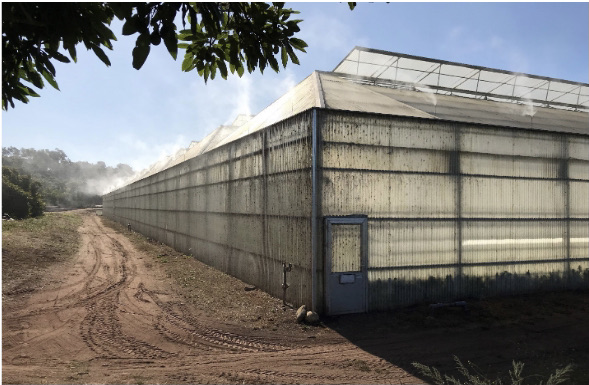
“All this is brought on by the county,” Neff said, noting that the coalition has spent more than $1 million on lawsuits, appeals, and the agreement with CARP Growers. “Look at the amount we’ve spent to do what the county should have done. I’ve put in at least $75,000 of my own money. It troubles me that the county doesn’t want to embrace scrubbers as a palliative and as a showing of good will.”
Most growers in the valley, including Farrar and the Van Wingerdens, are still using “vapor-phase” systems — perforated pipes around the perimeter of the greenhouses that release a perfumed mist into the outside air. They are designed to “mask” the smell of cannabis after it escapes from the roof vents.
Judging from the growers’ project descriptions, these systems are collectively releasing several hundred tons of the deodorant, a nontoxic mix of plant oils and water, into the valley air every year. Some residents have complained that the “laundromat” smell is as bad as the smell of pot.
A Change of Mind
On November 14, the Carpinteria City Council, which has long pressed the county to enact stricter regulations for the industry, voted 5-0 to send a letter to board Chair Das Williams, a chief architect of the county’s cannabis ordinance and a resident of Carpinteria, requesting that the county start requiring the use of carbon scrubbers in new and previously permitted cannabis greenhouses as the “sole best available” technology for odor control.
And on Tuesday, county Supervisor Bob Nelson introduced the subject for the first time, during a board discussion on cannabis tax revenue. He represents a portion of the Santa Rita Hills west of Buellton, where a number of outdoor cannabis operations are under cultivation.
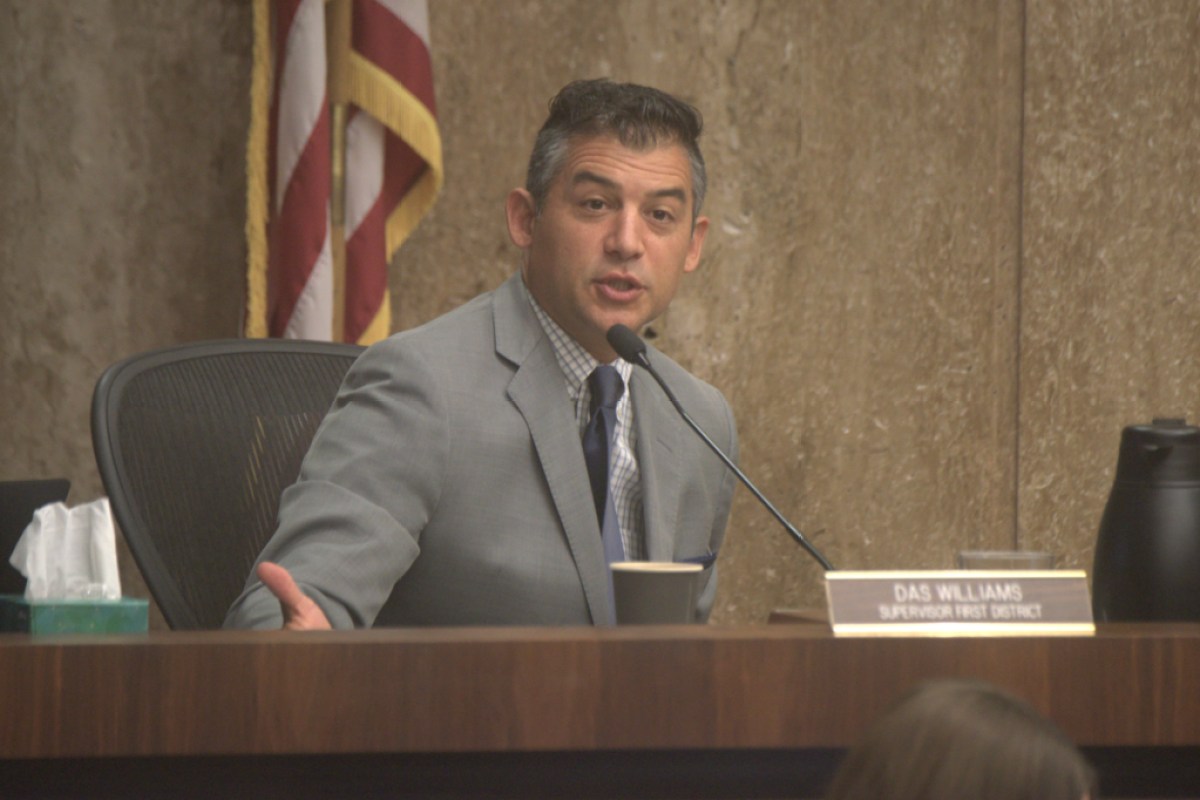
“There should be at some point a shift to best available control technology,” Nelson said.
Nelson requested that the board revisit the question of cannabis odor at a future hearing. Supervisors Capps and Joan Hartmann, whose district also includes part of the Santa Rita Hills, enthusiastically agreed. Supervisor Steve Lavagnino of Santa Maria, a co-architect of the cannabis ordinance, cast the only “no” vote, suggesting that requirements for new technology would put growers out of business and trigger layoffs.
“Do we regulate any other odor in agriculture?” he asked. “You’re not going to be able to put odor control in outdoor grows.… I think we’re opening a Pandora’s box.”
Although he voted to revisit the question, Williams has long favored seeking the growers’ voluntary cooperation; he has said he believes it is the fastest way to get scrubbers installed. Williams said again on Tuesday that it would take two years to change the ordinance to require scrubbers. He noted that the county can require them if growers are unable to resolve odor problems through the complaint response protocol — though, admittedly, the county has never taken that step.
“The only thing that has stood in the way of it has been knowing the source of the odor,” Williams said in an interview. And he added: “Mandating a specific technology is a bad idea…. We might have a technology in a year or two that’s even better. We don’t want to have a system that we then have to unravel.”
Mike Cooney, the county planning commissioner for the valley and Williams’s appointee, takes a different view. At the commission level, he said, “We’ve constantly called for an amendment to the ordinance to require scrubbers.”
“I’d rather have someone stop growing than not put the scrubbers in,” Cooney said. “I would like to see the county be more aggressive. If we say a year and they don’t have them in, there ought to be at that time a revocation letter that goes out and says, ‘Thirty days from now, your permit will be invalid.’”
‘Act Like Neighbors’
As part of its negotiations with CARP Growers two years ago, the coalition agreed to put on hold a “nuisance” lawsuit it had filed in 2020 against Ed Van Wingerden, the owner of Ever-Bloom, an 11-acre cannabis operation at 4701 Foothill. (Ed heads a separate branch of the large Van Wingerden farming family in the valley and also is a member of CARP Growers.)

In November 2022, Ed Van Wingerden and his partners released the results of a $750,000 controlled study, paid for by Ever-Bloom and conducted in Carpinteria, showing that a three-stage carbon scrubber engineered by Envinity Group, a firm based in the Netherlands, could eliminate, on average, 84 percent of the smell of cannabis inside a greenhouse before it could escape through the open roof vents.
The scrubbers cost $22,000 each, and the recommended density was 10 per acre — an expensive proposition, now that the price of wholesale cannabis has dropped to $500 per pound, down by more than half since 2020.
“That’s the cost of doing business,” Neff said. “Growers have the choice of spending the money on attorneys or putting in scrubbers and doing a service to the community.”
In 2022, Ed Van Wingerden installed 110 scrubbers at Ever-Bloom, or 10 per acre, at a cost of more than $2 million. He and his partners also purchased 100 extra Envinity scrubbers to sell to other growers, without much success so far; 12 have been purchased for a processing building, but none for greenhouses.
Last June, Neff said, the coalition dropped its 2020 lawsuit against Ever-Bloom. Van Wingerden paid $185,000 to cover the group’s attorney’s fees; $45,000 to cover the moving expenses to Ventura incurred by Greg and Marllus Gandrud, former neighbors of Ever-Bloom and former plaintiffs in the case; and $5,000 to Paul Ekstrom, another former plaintiff, in recompense for the air ventilation system he installed at his home on Manzanita Street.
Yet as of today, county records show, only two “grows” in the valley are equipped with Envinity scrubbers in their greenhouses, and both are owned by Ed Van Wingerden — Ever-Bloom on Foothill, and Roadside Blooms at 3684 Via Real.
At Farmlane, two greenhouse operations at 1400 and 1540 Cravens Lane, an earlier brand of scrubbers is in use. The owners, Cindy and David Van Wingerden, were the first to adopt the technology, three years ago. They are not members of CARP Growers.
Winfred Van Wingerden, Ed’s brother and a CARP Grower member, plans to install Envinity scrubbers early next year at Maximum, four acres of cannabis greenhouses at 4555 Foothill.
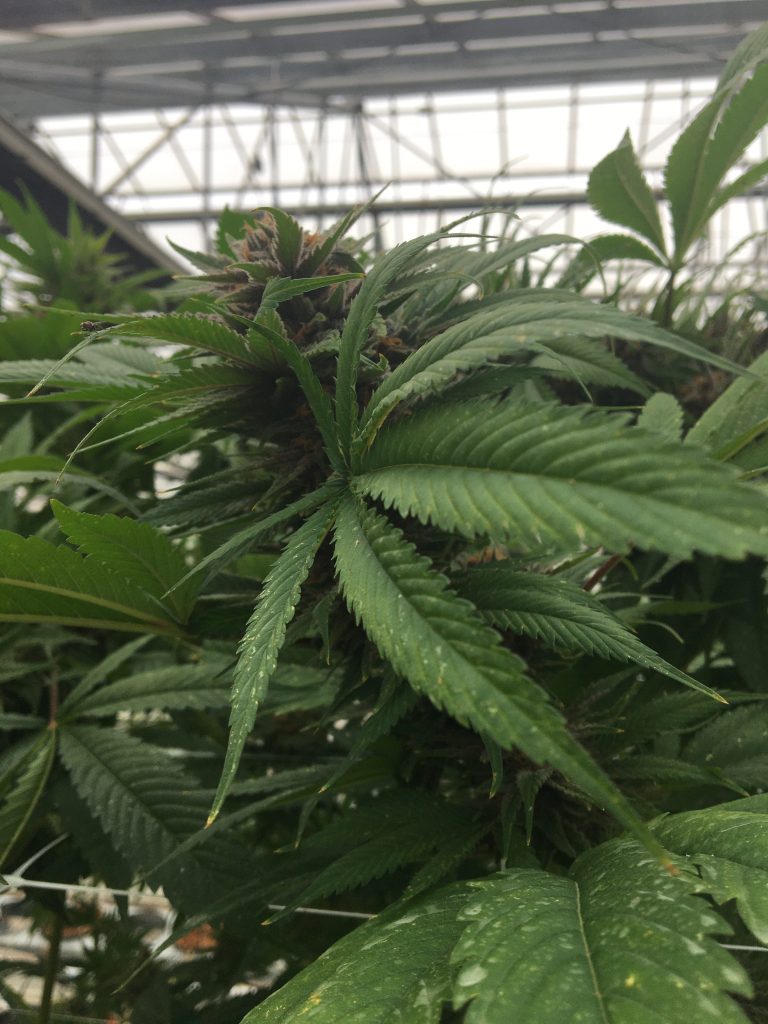
And Farrar plans to install Envinity scrubbers early next year at Glass House Farms, a three-acre greenhouse operation at 5601 Casitas Pass Road, though not at the recommended ratio of 10 per acre. They will join six scrubbers of a different model that are currently in place at Glass House.
Glass House is one of five “grows” at the eastern end of the valley, where administrators at Cate School, a private boarding school on Cate Mesa Road, have complained that the smell of pot is a daily aggravation. In the past, Glass House has spent long stints at the top of the county’s odor complaint list.
“I want more people to get Envinity scrubbers,” county Board Chair Williams said. “Am I satisfied with the progress? I’m not. But I think things are moving in the right direction. Within the hot spots, most growers are making changes. I understand that it’s not as rapidly as some folks would like.
“In my judgment, we’ve gone 60 to 70 percent of the way, and it hasn’t really changed some people’s minds, and it’s frustrating. I hope if we get to a larger reduction in odors, it will allow for people to act like neighbors again.”
But for now, the matter is back in court. And members of Concerned Carpinterians, a loosely knit organization with 350 residents on its email list, say they welcome the coalition’s decision to rejoin the fray. Concerned Carpinterians has continued to file appeals of cannabis projects during the past two years.
“What ended up happening was that every appeal I made, the coalition refused to take a stand and actually spoke in favor of the growers and in opposition to what I was saying,” said Jill Stassinos, who belongs to both groups. “That was really difficult for me to understand, after having contributed money to the cause. I’m happy that, finally, they are becoming more supportive of Concerned Carpinterians.”
Ongoing Complaints
This year to date, among 350 odor complaints filed with the county, Carpinterians have described the stench coming from cannabis greenhouses as “very, very strong,” “overwhelming,” “foul,” “very unpleasant,” “nauseatingly disgusting,” “gross,” “miserable,” and “revolting.”
At the top of the list, with 98 complaints, is Farrar’s G&K Produce, eight acres of cannabis at 3561 Foothill Road. Farrar has not submitted a plan for scrubbers at G&K. The county renewed his annual business license for G&K in May.
“I’ve made complaints to this office before,” wrote a resident of La Mirada Drive who has filed 30 complaints against G&K so far this year. “However, the odor issues have yet to go away. I had stopped making complaints as they take up time and have not led to a decrease in odors. Nevertheless, I do not want my lack of reporting to make it appear that the problem has been solved. As such, I am again reporting the issues … to make it known that the problem still exists.”
In an interview, Farrar said he specifically picked his Foothill location for cannabis because it is not near homes or schools. There are other greenhouse operations in the vicinity, he said, so it’s impossible to know who is causing the smell in the La Mirada neighborhood, which lies in the hills above Foothill. As for the smell on the road in front of his operation, Farrar said, that’s not regulated by the county.
Farrar said he had been held up until now by state Coastal Commission review of a processing warehouse at G&K. Now that the warehouse has been approved, he said, he is “committed to addressing odor” in the greenhouses, adding, “Now we will have the ability to talk about what comes next.”
Other greenhouses near La Mirada include Autumn Brands, owned by Autumn Shelton, and Ocean Hill Farms, owned by Kelly Clenet; together, they are growing nine acres of cannabis at 3615 Foothill. Shelton was president of CARP Growers when the group signed the agreement with the coalition in 2021; she has not installed scrubbers and did not respond to a request for comment this month.
The Latest Lawsuit
Case and Alex Van Wingerden, the defendants in the coalition’s latest lawsuit, own nine acres of cannabis greenhouses at Valley Crest and 10 acres at Ceres, two of the operations nearest Cate School.
William Hahn and Danielle Dall’Armi, owners of Rose Story Farm next to Valley Crest, and Chonnie Bliss Jacobson, a neighbor at 6217 Casitas Pass Road, have joined the coalition as plaintiffs in the recent lawsuit. They allege that the stench of cannabis from the two greenhouse operations has lowered their property values and reduced the rental and business income at Rose Story Farm.
According to Marc Chytilo, a former coalition lawyer, the odor response protocol in the CARP Growers agreement broke down at Valley Crest and Ceres. The coalition reported to the operators dozens of instances of odor problems at the Rose Story Farm in windy conditions, Chytilo said, with Valley Crest and Ceres as “the most likely cause.”
“Sometimes they had excuses, and other times we just didn’t get a response at all,” Chytilo said. “Over time, it was clear they were unwilling or unable to take steps to control their odors. At times, it seemed they didn’t believe they were generating odors.”
Case and Alex Van Wingerden “have shown little concern for the citizens of Carpinteria,” the coalition’s lawsuit alleges. “Instead, they have focused on lining their pockets with profits from this modern-day cash crop.”
In a recent court filing, the Van Wingerdens responded that the damages claimed by the plaintiffs were “speculative and uncertain.” In plans submitted to the county this month, they proposed installing CleanLeaf scrubbers, a model that sells for $4,500. The company is headquartered in St. Louis, Missouri.
Neff is not impressed: “It’s nothing but a stalling tactic,” he said. “Why are they looking at other scrubbers when Envinity works?”
Tristan Strauss, the Valley Crest and Ceres operator, a past president of CARP Growers and the CEO of Headwaters, a bulk cannabis supply company in California, did not respond to requests for comment on the lawsuit. Strauss played an active role in drafting the agreement with the coalition; in turn, the coalition put on hold an appeal of one of Strauss’s five cannabis active “grows” in the valley. None of Strauss’s operations are equipped with scrubbers.
At a county hearing on the Valley Crest project last year, Strauss said: “The cannabis market is in a place of peril right now. The cost of scrubbers is prohibitive. Politicians in Santa Barbara County have to decide if they want us to stay here.”
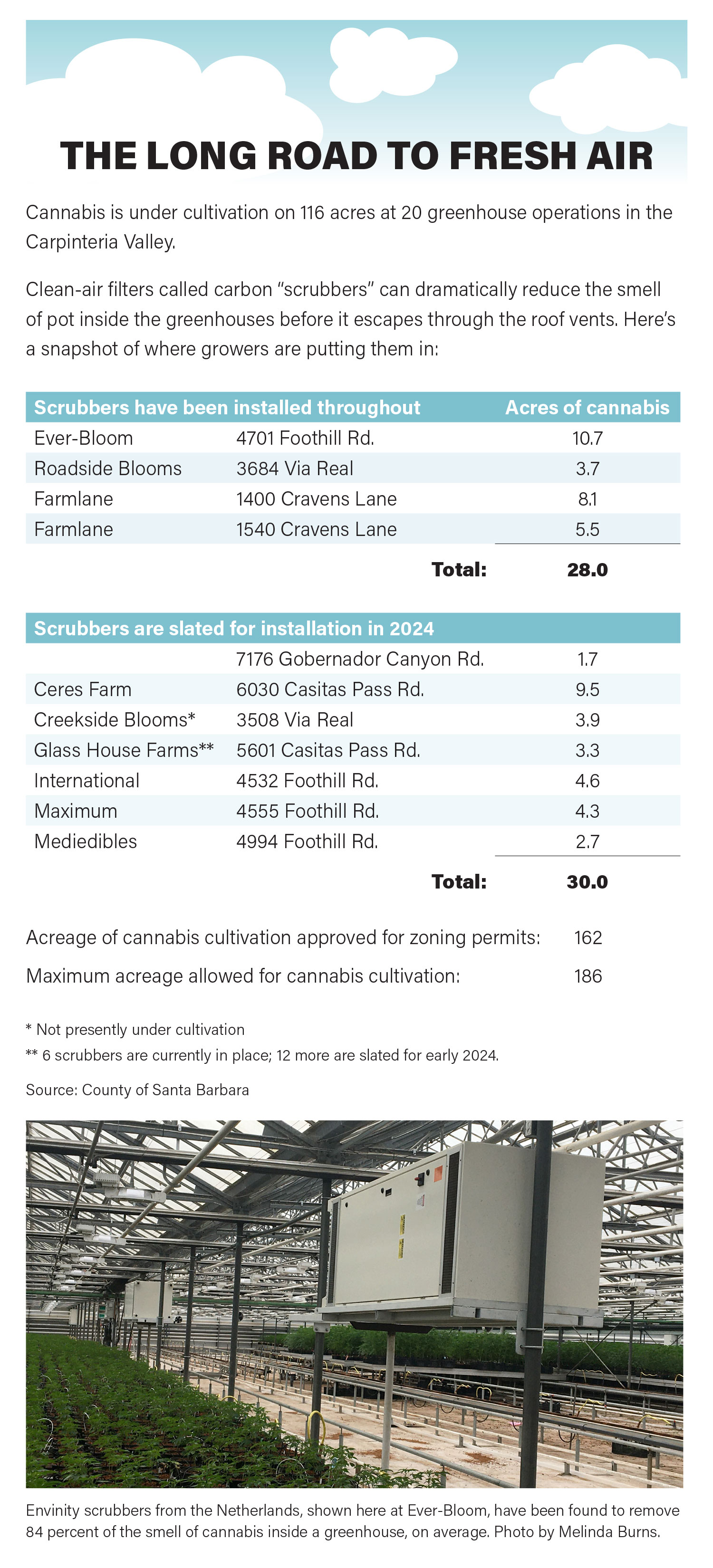
The View from the Netherlands
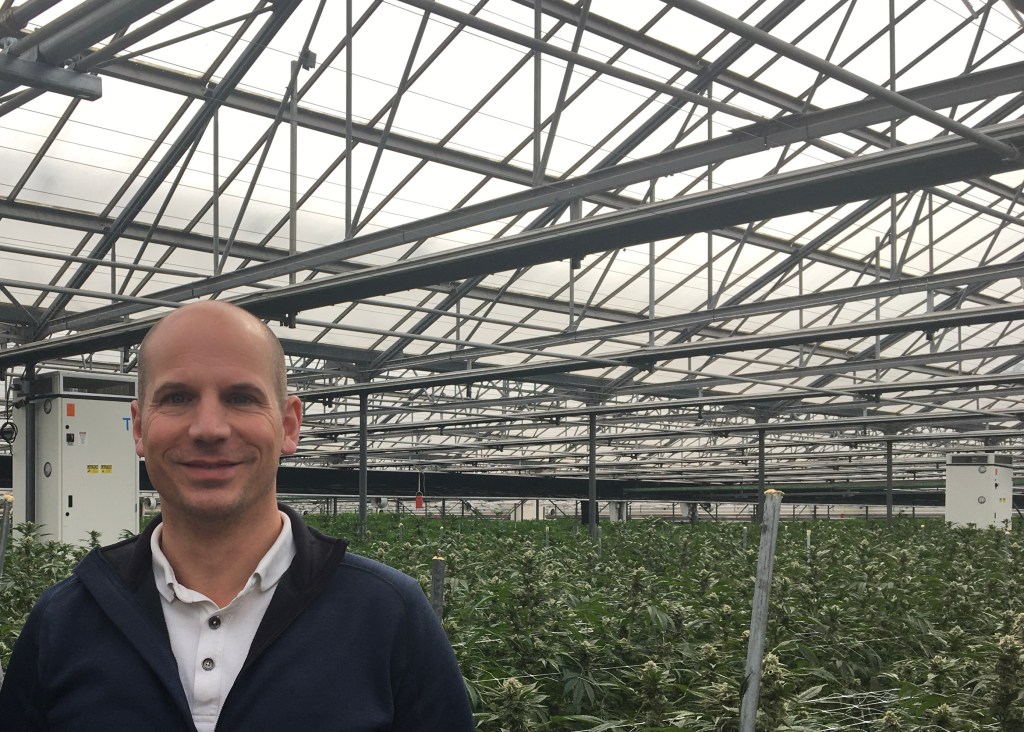
Simon van der Burg, the cofounder and managing partner of Envinity, has made 15 trips to the Carpinteria Valley during the last two years, visiting greenhouses and talking to all the growers. On his last trip in March, he said, he came away empty-handed, with no orders for scrubbers. He plans to return on December 3.
“I’m definitely disappointed because we spent three-quarters of a million euros [$800,000] doing everything CARP Growers wanted,” van der Burg said, “and in the end, we were the best proven technology.”
“I wish they saw it as more like an investment project that also solves odor,” he said, adding that the scrubbers also remove dust, mold, viruses, bacteria, and pesticide drift. “We want them to buy it from us because they want to buy it and not because the government is pushing them to buy it.”
If all the cannabis growers in the Carpinteria Valley were to place orders today, delivery could start within five or six months, and Envinity would deliver the scrubbers before the first of June 2024, van der Burg said. But he said the growers have told him they’re struggling to meet payroll and avoid layoffs.
“The market went down, so the money is gone,” van der Burg said.
Envinity’s main business is air filters for petrochemical firms and for companies such as yacht-building firms that do a lot of spray-painting. Envinity also sells scrubbers designed for hothouse lettuce and tomato operations.
To meet the challenge in cannabis, a new industry for his firm, van der Burg said Envinity tested 500 filters to develop a model that worked. Figuring out what odor is and what it does was “a very, very, very difficult question,” he said.
Inside the Envinity scrubbers, greenhouse air is pre-filtered to remove both large and small particles before they can clog up the works. Next, the air passes through a carbon filter, where it is exposed to titanium oxide and ultraviolet light to oxidize and reduce the smelly gases. In the final stage, another filter captures any remaining gases. The technology is the first of its kind and the only model to be tested in a controlled study in the Carpinteria Valley.
Van der Burg’s own government, while tolerating the illegal sale of cannabis in coffee shops, has proceeded with caution when it comes to cultivation, which is still illegal in the Netherlands.
After a four-year period of research on the cultivation, supply, and use of cannabis; growers’ banking problems; and potential crime and public health problems, the government will allow the first two growers in the Netherlands’ “Controlled Cannabis Supply Chain Experiment” to start growing marijuana in December. They will be delivering to coffee shops in two Dutch cities. The shops must be owned by residents of the Netherlands and can sell cannabis only to residents of the Netherlands. In all, 10 growers and 11 cities will eventually participate in the pilot project.
“They want to be sure if cannabis is being produced, it’s being produced the way the government wants it to be produced, with all the correct permits,” van der Burg said. “It is really organized.”
Melinda Burns is an investigative journalist with 40 years of experience covering immigration, water, science, and the environment. As a community service, she offers her reports to multiple publications in Santa Barbara County, at the same time, for free.

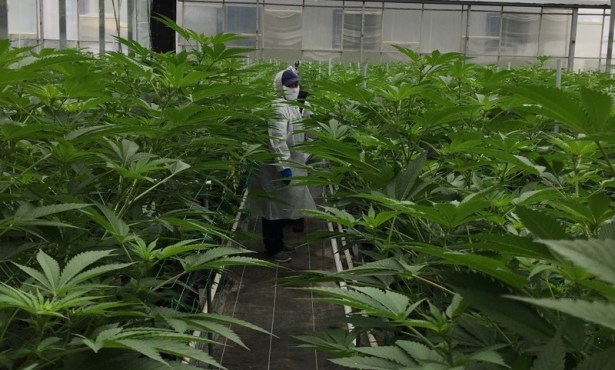
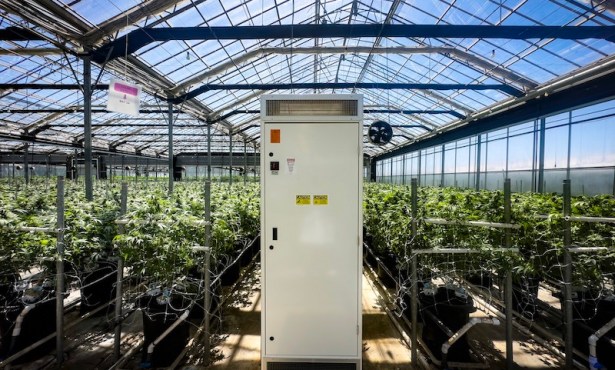
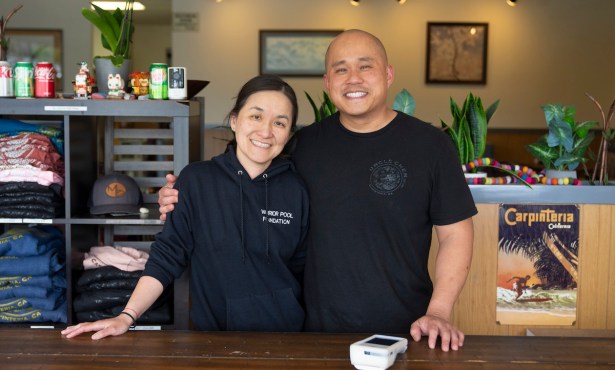
You must be logged in to post a comment.